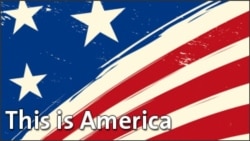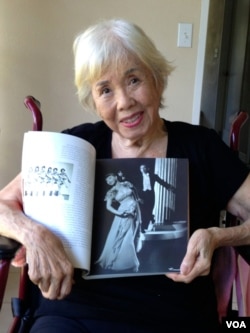In the 1930s, Asian-Americans performers did not have many opportunities in mainstream U.S. entertainment. These performers were limited to roles that simply made fun of their cultural heritage.
But in the 1940s and 50s, opportunities for Asian-American performers began to change. Chinese American nightclubs in California permitted singers, dancers and actors to overcome racial and cultural barriers and follow their dreams.
In 1989, filmmaker Arthur Dong captured that little-known part of entertainment history in his film "Forbidden City, USA." The film has now been re-made in a digital format. And Mr. Dong has turned his research into a new book.
A man named Arthur Dong grew up in San Francisco, California. As a young Chinese American boy in the 1950s and 60s, he walked by a nightclub in Chinatown, a neighborhood where many Chinese people lived.
He says he remembers walking past the nightclub’s marquees, or displays. They showed pictures of the performers wearing elegant gowns and tuxedos.
This made quite an impression on the little boy. Here is Arthur Dong.
"And I remember distinctly looking at the marquees, the glass display case, with all these wonderful black and white photos of Chinese people, but dressed in zoot suits and 1940s kind of gowns and tuxedos. And I had never seen Chinese dressed like that."
The nightclub was called Forbidden City, the same name as the imperial palace in China. It opened in 1938 and became very popular.
But in 1989, when Mr. Dong decided to make a documentary film about Forbidden City and other Chinese-American nightclubs, few of the people who remembered those nightclubs wanted to talk about them.
Mr. Dong says people felt uncomfortable. They were ashamed of the clubs, mainly because the women performers wore very little clothing. In other words, they were scantily dressed. For the conservative Chinese community of that time, he says, the subject of clubs was taboo -- something people do not want to talk about.
"They were ashamed of the clubs. You know the whole notion of women wearing scanty clothing, showing their legs in public, was taboo for the conservative Chinese community at that time. So I think the Chinese community really wanted to forget about these clubs, because they weren't proud of it."
Conservative Chinese parents also did not want their children to become entertainers. According to Mai Tai Sing, performing was not a high-class job. She says it was considered “low-grade.” Mai Tai Sing was part of a younger generation that became entertainers anyway. She started out as a chorus girl in the early 1940s.
"Well this young lady knows exactly where she is going. She is one of the dancing stars of Charlie Low's fabulous Forbidden City in San Francisco. Her name is Mai Tai Sing, and she's America's most beautiful Chinese entertainer."
Mai Tai Sing is now 91 years old and lives in Hawaii. She recalls the golden age of Forbidden City. She says the nightclub had it all -- dancers, comedians and singers like Larry Ching, who was called the Chinese Frank Sinatra.
Forbidden City – the nightclub, not the Imperial Palace – was even featured in major U.S. media outlets, including Life magazine. In its heyday, major U.S. celebrities like Bob Hope, Bing Crosby and Duke Ellington came to see shows there.
But the club’s popularity still did not protect the performers from racial comments made by a mostly white audience. This is according to a writer and broadcaster named Ben Fong-Torres.
"So even though you are the stars of the show, they still feel superior to you and make remarks, racist remarks, to your face or shout it out from the audience. And I think that was pretty difficult for most of these entertainers to take. But as Larry Ching said, 'I had to, otherwise I wouldn't be in the business."
Mr. Fong-Torres says that over time, Asian-American nightclubs changed people’s minds and attitudes about Asian-Americans.
He says the clubs also shattered conceptions, a common expression that means to change a person’s thoughts about something.
"This was quite a bold experiment, and it shattered conceptions that people might have had about other people of color. And it was one of the major platforms for a change of mind, a change of attitude, a change of perception on the part of those who came in."
Singer Jimmy Borges remembers one evening.
"And I was singing 'Fever' (he sings) 'Never know how much I love you, never know how much I care. You give me fever.....' And this lady, she was looking at me and there was this look in her eye of complete mystification. And she says to her husband; she nudges him with her elbow 'Oh, Charlie, he sings just like a white man.' And that was so funny because she didn't mean it in a bad way. She meant it like she had never seen anybody like me sing a song that was made famous by a white person."
<div style="text-align: center;"><object width="425" height="344"><param name="movie" value="http://swf.tubechop.com/tubechop.swf?vurl=oUj7Hb-yj7s&start=38.56&end=102.12&cid=5942702"></param><embed src="http://swf.tubechop.com/tubechop.swf?vurl=oUj7Hb-yj7s&start=38.56&end=102.12&cid=5942702" type="application/x-shockwave-flash" allowfullscreen="true" width="425" height="344"></embed></object></div>
Some Forbidden City performers went on to become famous in American television and movies. For example, Pat Morita was in the movie “The Karate Kid,” and Jack Soo was in “Barney Miller,” a popular 1970s television show in the U.S. about a police station.
Filmmaker Arthur Dong says the early nightclub performers continue to inspire young Asian-Americans today. They were rebels, he adds, who went after their dreams.
"They knew what they wanted. They had dreams. They had goals. And they weren't going to let larger societal bigotry get in their way. And they had fun doing it. These folks had a lot of fun struggling to achieve their dreams. I mean, it was a lot of heartbreak, a lot of hard work. But what they wanted to do was sing and dance. And they did it, by golly. And they said ‘Nothing is going to stop me.’ For me it’s an inspiration.”
Arthur Dong has written their stories in a new book, "Forbidden City, USA: Chinese American Nightclubs, 1936-1970."
I’m Anna Matteo.
Heidi Chang reported this story. Anna Matteo adapted it for Learning English. Kelly Jean Kelly was the editor.
______________________________________________________________
Words in This Story
marquee – n. a sign over the entrance to a theater that shows the name of the show, movie, play, etc., and the names of the performers
elegant – adj. showing good taste : graceful and attractive
gowns – n. a long, formal dress that a woman wears especially during a special event
tuxedo – n. a formal suit for a man
heyday – n. the time when someone or something is most successful, popular
scanty – adj. very small in size or amount : scantily is the adverb
ashamed – adj. feeling shame or guilt
taboo – n. not acceptable to talk about or do
rebel – n. a person who does not obey rules or accept normal standards of behavior
bigot – n. a person who hates or refuses to accept the members of a particular group (such as a racial or religious group); bigotry – n. bigoted acts or beliefs






